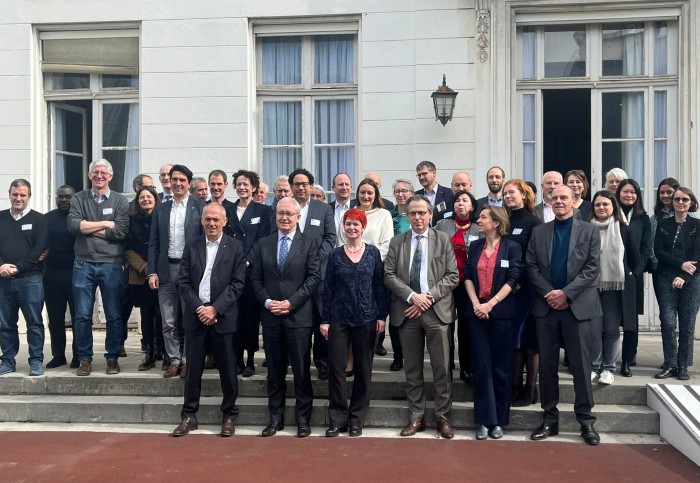'Imperial is committed to growing collaborations with Europe': President Brady

Imperial is committed to growing its collaborations with partners in Europe said President Hugh Brady during a trip to Paris to meet academic leaders.
President Brady was speaking at the first annual workshop of the joint research centre created by Imperial and France’s National Centre for Scientific Research (CNRS) to strengthen scientific partnerships between the UK and France.
Imperial and French scientists are working together through the CNRS-Imperial International Research Centre for Transformational Science and Technology (IRC) on a broad range of research areas – such as artificial intelligence, climate change, material sciences, medicine and chemistry. One of the aims of the Centre is to explore ways Imperial and CNRS can collaborate to work towards the UN’s Sustainable Development Goals (SDGs).

Speaking at the opening plenary of the Convergence Science for Sustainable Development event, President Brady said: “We are proud that the CNRS-Imperial IRC is the only one in Europe at present and we are determined to make the most of this platform.
“At the heart of the IRC and our collaboration, is a desire, a need, to address global challenges, including the UN Sustainable Development Goals.”
President Brady added: “I want to emphasise that partnerships with Europe are especially important now post-Brexit. Imperial is committed to remaining a European university and to growing our collaborations with Europe.
“There are tremendous opportunities to identify areas where each of our institutions excels, and bring these groups together to do things we could not do on our own, to make people’s lives better in France, in the UK, and around our world.”
President Brady was speaking alongside Chairman and CEO of CNRS, Antoine Petit, who was a signatory of the Stick to Science campaign calling for open and barrier-free collaboration among Europe’s research and innovation ecosystem.
President Brady discussed in an interview with Times Higher Education this week the need for the UK association to Horizon Europe to be finalised soon.
He said: “If you have an ambition to compete with America you have to look at our strengths, and how to build on those strengths through partnership. That brings you to the importance of collaboration within Horizon Europe and it’s only when we can engage in such an ecosystem do you get the scale to take on the US or China. We need those discussions around Horizon to progress because they are so important to our competitiveness.”
French connections

Imperial has a long history of collaborating with partners in France and the last few years have seen some major flagship projects announced.
Earlier this year Imperial, CNRS and the University of Lille set up a major project into metabolic diseases.
Diseases linked with metabolism, such as diabetes, high blood pressure (hypertension) and obesity affect millions of people around the world. This new collaboration will aim to 'fast-track' treatments for these conditions. The Integrative Metabolism International Research Project (IRP) aims to use artificial intelligence, machine learning and other methods to improve understanding and develop potential drugs and treatments for these conditions.
The French space agency CNES and Imperial scientists also worked together to carry out an orbital mission to test how objects fall in a vacuum. The first results confirmed Einstein's general relativity theory and the 'equivalence principle' with unprecedented precision showing that gravity is not a 'pulling force' but is the result of large bodies, like the Earth, bending space-time. The Microscope satellite experiment is continuing to collect data and the team hope that the final analysis will have a precision within a tenth of a trillionth of a percent.
Imperial has a growing French community both in London and overseas. With more than 600 French students at Imperial currently, French students make up the largest European group at the College. Imperial also has thousands of alumni living in France – many of whom President Brady met at an event in Paris to hear about their stories since graduating.
Article text (excluding photos or graphics) © Imperial College London.
Photos and graphics subject to third party copyright used with permission or © Imperial College London.
Reporter
Stephen Johns
Communications Division